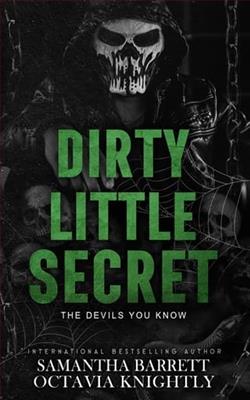Page 4 of Against the Current
That was why he was here at the bank, preparing to embarrass himself.
If Grandpa Jeremy Sutton could see me now, he’d disown me, Ryan thought. His stomach lurched, and he thought he might throw up.Pull it together, Ryan.
“Ryan and Trisha Lewis?” A fifty-something banker in a suit called their names and led them into a corner office with blinds that ensured whoever walked by the window couldn’t see the most depressing day of Ryan’s life. It was a welcome, if momentary relief.
Trisha sat primly and spoke enthusiastically to the banker about what he’d done for Christmas. Ryan knew what she was doing—buttering him up and trying to make them all seem like friends.
“My parents and siblings came into town,” the banker said, his voice chipper. “It’s nice with so many children around. And you two? What did you do?”
Trisha smiled. “It was just the five of us! Us and our kids Gavin, Willa, and Rudy. It was quite cozy. We loved it, didn’t we, Ryan?”
Ryan found it difficult to watch Trisha play-act their happiness like this. Had she been truthful, she might have told the banker that they’d given their children approximately half the number of presents they usually did. There had been a general malaise around the house—that was, until Willa had erupted into one of her tantrums.
It was hard not to feel like the biggest failure in the world.
Trisha put her hand on Ryan’s knee, and Ryan winced. It had been a long time since they’d touched.
Over the next half hour, Trisha and Ryan outlined their predicament to the banker. Well, Trisha did most of the talking because she didn’t trust Ryan to sound upbeat. She was probably right. Ryan was a bad actor.
“We’ve had a rough go of it as of late,” Trisha explained. “Ryan’s office cut bonuses, fired a ton of people, and even cut Ryan’s wages by fifteen percent. He might have quit, but as you know, there just aren’t that many jobs around. We’re in a tight spot.”
The banker tutted and looked at Ryan likepoor you. Ryan resented it.
“What was your degree in?” the banker asked.
“I majored in advertising. Marketing,” Ryan explained.
“I understand. People are cutting their advertisement budget left and right,” the banker said as though Ryan didn’t know that. That was something Ryan knew in his bones.
But thanks for the info, Ryan didn’t say.
Trisha nodded eagerly. “Exactly. But the thing is, Ryan is a fantastic marketer. You remember that commercial with the turtle and the can of soda?”
The banker shook his head and tugged his tie nervously.
“Come on. The turtle opens the can of soda with his fin?” Trisha pushed it. “It was a Super Bowl commercial four years ago. Huge. Went viral.”
“It’s ringing a bell,” the banker said, although Ryan was sure he was lying.
“Right? Ryan wrote that. And he wrote several others that went semi-viral. The thing is, over the past few years, the people who own and operate his advertising agency made a series of horrible decisions. Now, Ryan’s career is murky at best. He needs to step out on his own. He needs money—for our lives and for his new venture.” Trisha smiled broader.
The banker’s face turned a shade of green. Was he getting sick? Or did he just feel what Ryan was feeling? Was he that empathetic?
“And on top of that, our daughter was recently diagnosed with autism,” Trisha said, her smile fading. Not even she couldfake this part. “We struggled for years to know what was going on. It’s much harder to diagnose girls with autism, as you probably know.”
“I have heard that.” The banker nodded.
“Of course, we’re thrilled to have a path forward,” Trisha said. “We love our girl to bits, and we want to do everything in our power to help her. But with the diagnosis come treatment plans and medications and on and on. All of that costs money.”
The banker winced. Already, Ryan had a sense of what was coming.He’s going to send us packing,he thought.And it’s because he doesn’t see us as people.
Trisha told the banker a few more things she thought would really sell their mission. She talked about Ryan’s work at their children’s elementary school. She spoke about how she worked two jobs to make ends meet—one managing the produce section at a grocery store and another selling expensive makeup and Tupperware to women who already have everything they could ever need. But at the end of their allotted half hour, the banker flashed his palms and said, “I’m sorry, folks. There’s really nothing I can do. The bank needs to know you’ll have more upcoming cash flow before it can offer a loan. And what we’ve seen over the past few years is on the lower end of things.”
“But that’s why we need a loan,” Trisha reminded him with a sweet smile.
“Do you have any family you could ask to cosign?” the banker asked. “Perhaps a parent? A sibling?”
Trisha shook her head. “We don’t have anyone. I told you. For Christmas, it was just us. It’s always just us.”















